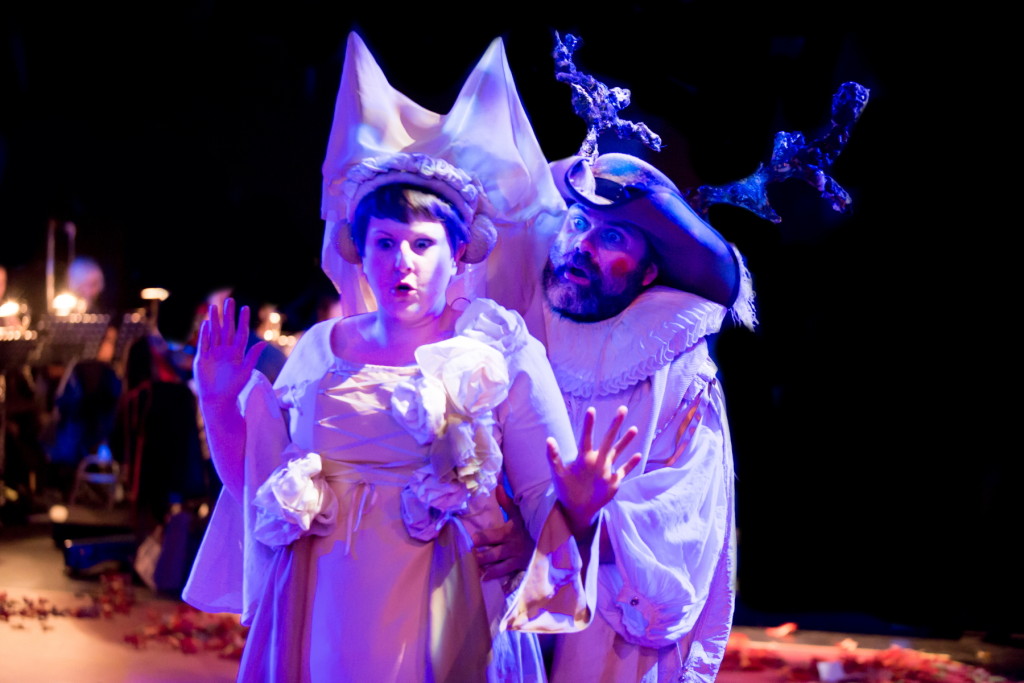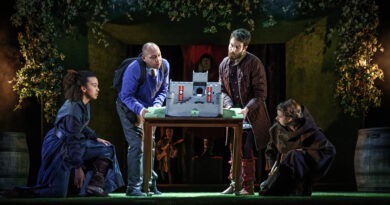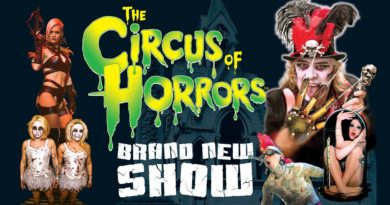Falstaff at Tobacco Factory Theatre

South Bristol’s Tobacco Factory Theatres is one of those inclusive places that offers something for everyone, from free theatre in the bar to those larger, more expensive productions, entertainment for babes in arms to theatre meal deals, hour long monologues by new and emerging writers to 3+ hour classics. As regulars at these exciting venues (Brewery Theatre and Tobacco Factory Theatre), we never really know what to expect.
We saw Opera Project perform here almost a year ago to the day with Madame Butterfly, a story that left me reeling with anger and, as a newcomer to the genre, confused and questioning of my own intelligence. The company now returns to Tobacco Factory Theatres to collaborate with them on Giuseppe Verdi’s final opera and one of his two comedies, Falstaff.
Sir John Falstaff is a centuries’ long popular Shakespearean character who appears in The Merry Wives of Windsor and the two Henry IV plays. Arrigo Boito made him the central figure in his late nineteenth century libretto, written for Verdi and adapted into an opera by the septuagenarian composer.
The fat, greedy Falstaff is down on his luck and attempts to remedy this by wooing Alice Ford and Meg Page, with a view to eventually gaining financial support from them/their husbands. But Falstaff’s plan is ill-thought through and the two women, along with Alice’s daughter, Nanette, and their friend, Mrs Quickly, realise at once that Falstaff has written them the very same love letter and they plot to put an end to his deceit, outwitting him at every step.
Meanwhile, through talks with Falstaff’s temporarily sacked servants, Bardolph and Pistol, Alice’s husband, Mr Ford, becomes wise to Falstaff’s desire to seduce his wife and also seeks vengeance, helped along by Dr Caius, who has been recently robbed and humiliated by our eponymous hero, and by Fenton, who, in love with Ford’s daughter, will do anything necessary to gain his favour so that he can marry Nanette (Ford has promised her hand to Dr Caius).
And so begins a comedy of twists and turns as everyone is out to get Falstaff, a man so conceited that he truly believes that any woman would succumb to his charms.
This is an opera performed in three Acts and the fact that a 20-minute interval is called after each of these Acts makes it easy to digest and non too rigorous an evening. Verdi’s music, here conducted by Jonathan Lyness, who presides over a reduced and tight orchestra, is welcomely light and often falls into societal laughter in the ‘he-he-he s’ and the ‘ha-ha-ha s’ of delightful revenge by the cast, particularly the women.
Translated into English by Amanda Holden, one does have to concentrate on what is being sung and this is the most challenging part of this production. Delivered in the round of TFT, it is unlikely that this could have been performed in Italian because placing the surtitles would have proved extremely tricky so it makes sense for this to be in our native tongue. However, although I’m convinced they are vocally excellent, I found the men at times difficult to interpret. The women of Windsor were the strongest element for me and maybe it should be so, given that it is they who ultimately triumph, not only over Falstaff but over Ford and Caius’ determination to disregard Nanette and Fenton’s love for each other. Both plans are successfully thwarted.
Maybe the strongest performance comes from Gaynor Keeble’s Mrs Quickly, who drew me to her every time she spoke/sang – she takes control of the plot to outsmart Falstaff and, in doing so, takes command of the stage. Alice Ford, played by Angharad Morgan, also won me over with her crystal clear vocals and encouraging smile. Our hero must have been melting in his fat-suit though that doesn’t prevent him from quickness of step as he darts around the stage with impressive vigour and a cheeky grin.
Set-wise, this is the busiest I’ve ever seen the TFT stage, an oak tree providing a central point for the cast to pivot around, making sure we all get full view of proceedings, while the skyline is furnished with washing lines packed with off-white shirts. Richard Studer’s design and direction works; the whole jolly thing works.
Falstaff gets his comeuppance but he is never really the villain and we all leave the auditorium believing that the outcome is a fair one, after all, “The whole world is a jest … but he who laughs last laughs best.” Without doubt, this is a comedy and a show that offers a glow on a chilly autumn evening.
- Falstaff show at Tobacco Factory Theatres until 24th October



